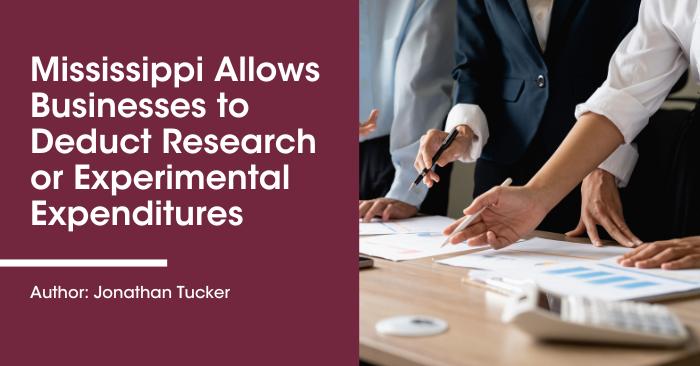Mississippi Allows Businesses to Deduct Research or Experimental Expenditures
By Jonathan Tucker, Principal | Published Monday, April 3rd, 2023
On Monday, April 3, 2023, Mississippi passed H.B. 1733, a change in the Mississippi State Income Tax Law. The law allows businesses to elect to fully deduct research or experimental expenditures in the year they are incurred. It suggests changing the methods of depreciation used for certain expenses and properties. In general, depreciation means reducing the value of something over time. The bill lists several types of business deductions that can be made when calculating taxable income, such as business expenses, interest paid on business debts, taxes paid or accrued, and losses sustained in the conduct of trade or business.
From Law 360 | Tax Authority
Mississippi will allow businesses to claim an immediate deduction for research expenses and some qualified property or qualified improvement property as part of a bill signed by the governor.
Republican Gov. Tate Reeves signed H.B. 1733 into law on Monday. The law allows businesses to elect to fully deduct research or experimental expenditures in the year they are incurred. Businesses may also elect to deduct expenditures of qualified property or qualified improvement property for a 100% bonus depreciation in the tax year the property is placed into service.
Businesses can make the election to immediately deduct expenditures starting in tax year 2023.
The law was originally introduced by Rep. John Thomas Lamar, R-Senatobia, on Feb. 21. It was adopted by the House by a vote of 111-0 and by the Senate by a vote of 52-0.
Our experts can help navigate these changes as businesses determine eligibility for R&D Tax Credits.
Research and Development
Research and Development tax credit (R&D) is an integral part of running a successful business, as it enables the development of new products, processes, and technologies that can help a company stay ahead of the competition. Companies often invest heavily in R&D to create an edge and remain competitive in their industry. It is essential to know how these R&D expenditures are treated for tax purposes and how they can help a company reduce its tax burden. R&D expenses can be deducted from a company’s taxable income, resulting in a lower taxable amount and therefore a lower overall tax bill. Additionally, certain R&D expenses may qualify for tax credits or be eligible for other tax incentives. Understanding the rules and regulations surrounding R&D expenditures and the tax implications of these expenditures can help a company maximize its tax savings and ensure that it is taking full advantage of available tax benefits.
Research or Experimental Expenditures
Research or Experimental Expenditures, also known as R&E expenditures, are costs incurred by a company for the purpose of discovering information that caResearch and development expenses can be subtracted from a company’s taxable income. This reduces the taxable amount, leading to a lower overall tax bill.n be used in developing a new product or process. The Internal Revenue Service (IRS) allows these expenses to be deducted from a company’s taxable income, subject to certain limitations.
Qualify for Research or Experimental Expenditures
How does my business qualify for R&D tax benefits? The research must meet certain criteria to qualify for R&E expenditures. It must be done to discover technological information. This information should be used to develop a new or improved business component. The term “business component” describes many aspects of a taxpayer’s trade or business. These include products, processes, techniques, formulas, inventions, and software.
R&D tax calculators
R&D tax credit calculators are designed to estimate the potential tax benefits for companies investing in research and development (R&D) activities. Calculators use various inputs to calculate the amount of R&D tax relief a company may qualify for. Examples of inputs include company turnover, R&D expenditure, and applicable tax rates. The calculators may also take into account any grants or subsidies received by the company for R&D. Calculator results can assist companies in making R&D budget and investment decisions.
It can also provide guidance on potential tax savings. R and D tax credit calculators are estimates. The actual tax relief may vary depending on a company’s individual circumstances. It is important to note this.
What are R&E expenditures?
The IRS considers the following expenses to be R&E expenditures: wages, supplies, contract research expenses, and other direct costs incurred in the conduct of qualified research.
The research must also meet certain criteria to be eligible for R&E expenditures. The research must involve a process of experimentation that is intended to eliminate uncertainty concerning the development or improvement of a business component. The experimentation must involve the formulation of hypotheses and the testing of these hypotheses through systematic experimentation.
It is important to note that not all research expenses qualify for R&E expenditures. For example, market research or research conducted to improve an existing product may not qualify. Additionally, expenses incurred for the development of software that is readily available to the public may not be eligible for R&E expenditures.
How to Claim R&E Expenditures
To claim R&E expenditures, a company must file Form 6765 with their tax return. The amount of the deduction is generally calculated as a percentage of qualified research expenses. The percentage of the deduction depends on the company’s gross receipts for the current and previous four years.
Conclusion
R&E expenditures can provide valuable tax benefits to companies that engage in qualified research. These expenditures can help to offset the costs of innovation and development, providing a powerful incentive for companies to invest in R&D. It is important for companies to work with a tax professional to ensure that they are accurately claiming R&E expenditures and complying with IRS regulations.
Contact us today to get started.
Related Articles
- KBKG Tax Insight: Tax Court Denies Construction Company R&D Credits
- An Introduction to the Reverse Plea to the U.S. Senate and House of Representatives to Extend Section 174
- Inflation Reduction Act Expands Payroll Tax Credit Benefits for Small Businesses
About the Author
Jonathan Tucker – Principal
 Southeast
Southeast
Jonathan Tucker is based in Atlanta, GA, and has over 18 years of experience providing federal business tax advisory services, primarily in R&D tax credits and fixed asset/cost segregation reviews, to clients in various industries including technology, manufacturing, transportation, healthcare, retail and consumer products, hospitality, media and entertainment, financial, and other professional services industries. » Full Bio


